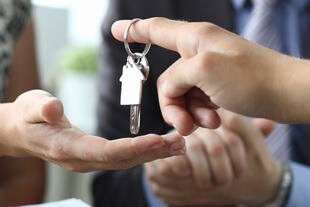A reverse mortgage helps you buy a new home or condo by taking out a reverse mortgage on that residence. Instead of paying for the home in cash or taking out a traditional mortgage, you use a reverse mortgage to finance part of the purchase price without monthly payments.
Among the benefits of using a reverse mortgage:
- There are no monthly mortgage payments* for as long as you live in the home, so you can use that money for other things. (Of course, you’ll still be responsible for paying property taxes and required homeowner’s insurance.)
- It may help you more comfortably afford an upgrade to
- Spend less money out-of-pocket instead of all cash purchase
- Right-Size for more comfortable living.
- Use the proprietary jumbo loan option to finance loan amounts up to $4 million, significantly higher than FHA reverse mortgage (HECM) allows.
- You own the home, with your name on the title.
- The home purchase and a reverse mortgage closing are rolled into one, making your process simpler.
- Condominiums appraised at $500,000 or more do not require FHA approval.
Eligible Properties:
- Must be borrower’s primary residence
- Single family home
- 2-4 units with one unit occupied by the borrower
- Condominiums appraised above $500,000 do not require FHA Approval
| Purchase Price | ||||
|---|---|---|---|---|
| $500,000 | $650,000 | $765,600 | $1,000,000 | |
| Age | Cash req’d ** | Cash req’d ** | Cash req’d ** | Cash req’d ** |
| 62 | $251,645 | $326,345 | $383,914 | $592,645 |
| 70 | $227,645 | $295,145 | $347,165 | $537,645 |
| 75 | $216,145 | $280,195 | $329,556 | $510,645 |
| 80 | $199,145 | $258,095 | $303,536 | $468,645 |
| Comparing three ways to purchase a new home: | |||
|---|---|---|---|
| ALL CASH | TRADITIONAL MORTGAGE | HECM FOR PURCHASE | |
| Why? |
|
|
|
| Why Not? |
|
|
|
| *As with any home-secured loan, borrower must meet their loan obligations, keeping current with property taxes, insurance, maintenance and any homeowners association fees. A HECM is a home-secured loan that must be repaid upon default or a maturity event, such as when the home is sold, all homeowners have passed away, or the last surviving borrower no longer lives there as their primary residence. | |||
1. Your current mortgage(s) and any other existing liens against the property must be paid off at or before closing. You must live in the home as your primary residence, continue to pay required property taxes, homeowners insurance, and maintain the home according to FHA requirements. Failure to meet these requirements can trigger a loan default that may result in foreclosure.
This material is not provided by, nor was it approved by the Department of Housing & Urban Development (HUD) or by the Federal Housing Administration (FHA). LIB-W-013019-C | Rev. 01/30/19
Questions? Contact us now!

